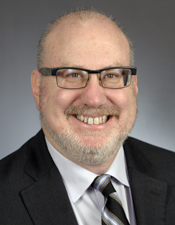Elimination of copays for HIV drugs could help end spread of disease
Since Dr. MJ Kasten, an infectious disease specialist at Mayo Clinic, began working with HIV patients 30 years ago, she has seen “amazing strides” in both the treatment and prevention of the disease.
Once-a-day medications can be taken for a short period of time to prevent infection after exposure, or continuously to suppress a person’s viral load – not only protecting them from dangerous health complications, but also removing the risk of transmission.
“Not only are they going to stay healthy, but this is a public health matter,” Kasten said. “In the long run, it’s less expensive to keep people on treatment.”
HF745, sponsored by Rep. Frank Hornstein (DFL-Mpls), aims to increase access to these medications by exempting them from Medical Assistance and MinnesotaCare copays.
The House Health Finance and Policy Committee laid it over Monday for possible inclusion in an omnibus bill.
A companion, SF349, is sponsored by Sen. Scott Dibble (DFL-Mpls) and awaits action by the Senate Health and Human Services Finance and Policy Committee.
Medical Assistance drug copays are $3 for brand-name prescriptions and $1 for generics, with a $12 monthly maximum. MinnesotaCare drug copays are $25 for brand-name prescriptions and $7 for generics, with a $70 monthly maximum.
Those copays may seem low compared to some drug costs, but they can pose a major barrier to many low-income, homeless, or unemployed patients. Spending money on medications might mean not buying formula or diapers for their kids, or groceries, or meeting other immediate needs, testifiers said.
“Having this particular barrier taken away would make such a huge difference in the lives of people we serve,” said Val Rubin-RaShaad Crutcher, who works with many unaccompanied and homeless youth as executive director of the Youth and AIDS Project.
A fiscal note is not yet available.
Providing regular and consistent access to medication is key to preventing the spread of AIDS in Minnesota, said George Konstantinides, a clinical pharmacist at Hennepin County Medical Center.
“Our providers throughout the state are doing such a great job testing for HIV. … We’re able to identify patients, especially earlier … get them on meds, and control the immune system,” he said. “HIV treatment, itself, is a form of prevention.”
Related Articles
Search Session Daily
Advanced Search OptionsPriority Dailies
Speaker Emerita Melissa Hortman, husband killed in attack
By HPIS Staff House Speaker Emerita Melissa Hortman (DFL-Brooklyn Park) and her husband, Mark, were fatally shot in their home early Saturday morning.
Gov. Tim Walz announced the news dur...
House Speaker Emerita Melissa Hortman (DFL-Brooklyn Park) and her husband, Mark, were fatally shot in their home early Saturday morning.
Gov. Tim Walz announced the news dur...
Lawmakers deliver budget bills to governor's desk in one-day special session
By Mike Cook About that talk of needing all 21 hours left in a legislative day to complete a special session?
House members were more than up to the challenge Monday. Beginning at 10 a.m...
About that talk of needing all 21 hours left in a legislative day to complete a special session?
House members were more than up to the challenge Monday. Beginning at 10 a.m...
